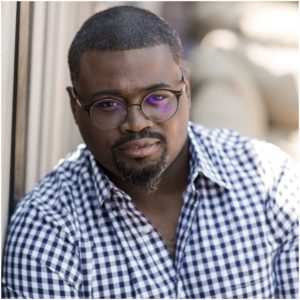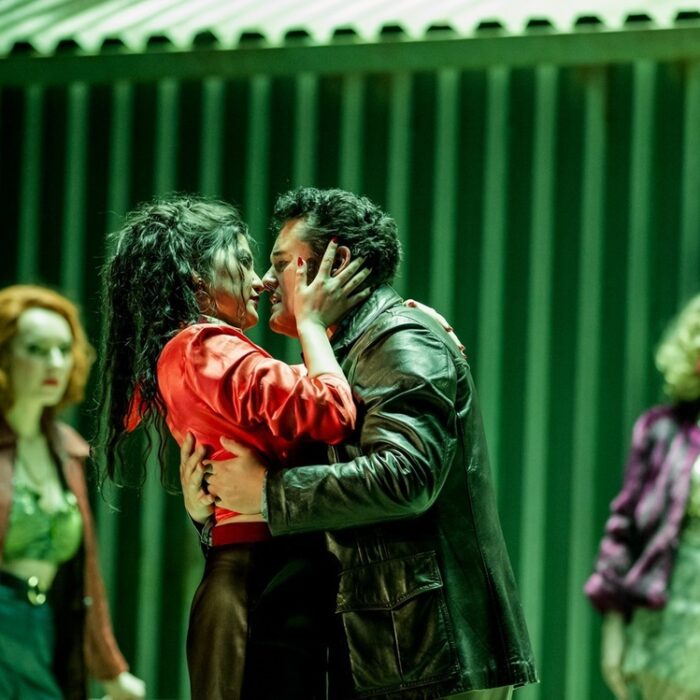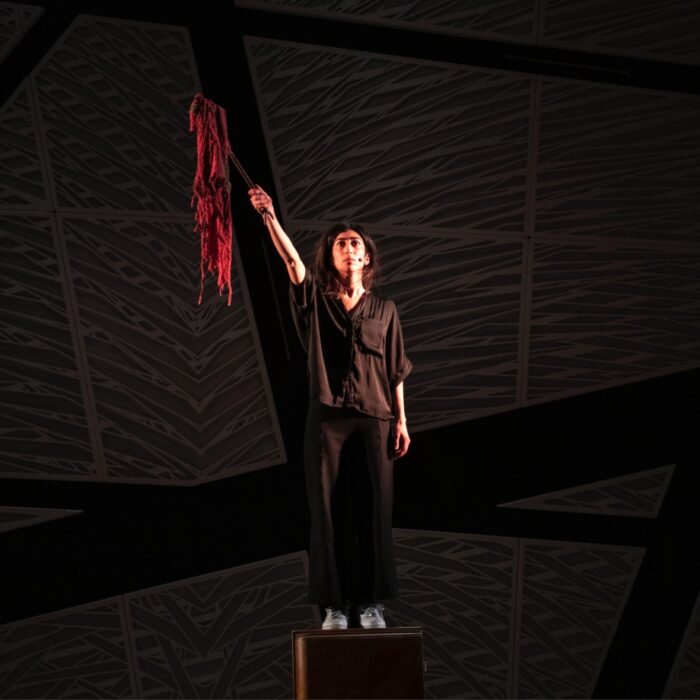
Los Angeles Philharmonic 2018 Review – Otello
Russell Thomas Shines Alongside Gustavo Dudamel In Verdi’s Masterpiece
By Gordon WilliamsLast year, rising Verdi star Russell Thomas spoke to OperaWire about his strategy for easing into such a titanic role the title role in Verdi’s “Otello.” “I always thought if I would try to take on such a monumental task, the first outing would have to be in concert so I can focus only on the singing and not have to worry about staging and costumes, etc.,” he said. Thomas performed “Otello” with the Atlanta Symphony Orchestra in October 2017. Last Sunday’s performance on July 15, 2018 with the Los Angeles Philharmonic and Gustavo Dudamel at the Hollywood Bowl could be considered another stage in that strategy. Thomas and his fellow-performers appeared in concert dress, although there was a degree of staging. The singers moved from music stand to music stand to express relationships between them – we even got to see Desdemona walk across stage with Cassio and heighten Otello’s suspicions about her fidelity. And there were brief lighting effects to underline the storm with which Verdi begins this tempestuous opera.
I was wondering how good an impression of this 1887 adaptation of a Shakespearean tragedy an audience-member could glean from an open-air concert presentation on a pleasant LA summer’s night. Basically, I came away marveling at the solid perfection of the score and what a convincingly-shaped performance this was in Dudamel’s (and chorus directors Grant Gershon and Anne Tomlinson’s) hands.
Keeping Otello ‘Light’
The Philharmonic’s publicity promoted Thomas in the title role, and I noticed in his OperaWire interview that Thomas spoke of “pacing” as “Otello’s” greatest challenge, “keeping the passion and emotion contained as much as possible.” I take this to mean that the tenor portraying Otello can’t fly too quickly to condemnation of Desdemona and must keep emotions in reserve even if, in my view, working slightly against the music’s drive. But Otello must establish a presence with his initial entrance, “Esultate…:” four lines of libretto that establish what Shakespeare took an entire First Act to establish: Otello is a formidable warrior, his military reputation thoroughly deserved. Thomas’s entrance had ringing authority, immediately establishing Otello’s primacy. But there was no harshness; Thomas succeeded in keeping Otello a lyrical tenor role. Where Thomas did flare up early on (momentarily, justifiably even, as, say, in the passage beginning “Pingea dell’armi il fremito…),” I read that as foreshadowing the fact that Otello has a quick warlike temperament that may not, in fact, require much provocation to be susceptible to Iago’s wheedling. But there was much other detail in Thomas’s interpretation. I noted the softening in his voice on “La mia dolce Desdemona” on his second entrance, which is potentially as assertive as the first. I particularly liked the stoic restrained starkness, the tragic closure, of “Niun mi tema,” Otello’s last monologue after he realizes he has killed a wife who is innocent.
Stage Manager
Of course, the opera is called “Otello,” but Iago, Otello’s corruptor, is so important that at one stage Verdi and his librettist, Boito, got into the habit of calling the opera, “Jago (Verdi’s spelling).” Iago in Georgian baritone George Gagnidze’s hands was clearly driving the plot, doing duty as Shakespeare/Verdi/Boito’s “stage manager.”
Iago can easily come across as a two-dimensional villain. But Gagnidze’s Iago was leavened by a humor that was a delight to experience (if that is not too weird a concept when talking about a villain). “Suave” and “ingratiating” are two of the comments I marked on my copy of the program. Gagnidze’s snigger at the end of “Credo in un Dio crudel” was a much better alternative to the demonic laugh which many baritones employ at the end of this number, undermining the serious darkness of Iago’s bleak view of life. His highly plosive’ “p’s” on the words “E poi? (i.e. “What next?” when considering the void after death)” were almost insolent toward the audience. And even though Iago and Otello have different voice-types, Gagnidze and Thomas came together in such unanimity in the second-Act finale, “Sì, pel ciel marmoreo giuro” that I couldn’t easily tell their timbres apart – aptly underscoring, to my mind, the fact that Otello had come across to Iago’s view of his wife.
Desdemona
It was a custom sometimes in 19th century theater to name an Act after the principal character upon whom the Act hinges. It happens in “Le Roi s’amuse,” the Victor Hugo play on which Verdi’s “Rigoletto” is based. It happens in “El trovador,” the Gutiérrez play on which Verdi’s “Il trovatore” is based. Act 4 of “Otello” could easily be called “Desdemona,” as the focus of the story suddenly shifts to Otello’s falsely accused wife and we see the devastation Otello’s unjust suspicions have wrought on her. Julianna di Giacomo has appeared previously in a Bowl opera-in-concert performance. She appeared in “Tosca” in 2016 again with Dudamel and Thomas. Her singing in “Otello” was consistently accurate and musical and thrilling, but once again I was struck by the detail and range in a characterization. “Salce! Salce! Salce!” she sang, as Verdi specified, “come una voce lontano” in the Willow Song (in fact, very lontano, and beautifully echoed even more faintly by Carolyn Hove’s Cor anglais). “Unjustly killed,” sang di Giacomo from the side, as cast-members burst in on the murder scene. It was a rasp, dramatically appropriate. And it was as if di Giacomo had found a completely new tone, not previously-employed, in her prayer, “Ave Maria” just before the murder.
Besides the strong principals in this cast, I was struck by Paolo Fanale’s Cassio. The challenge I would think is to portray Cassio as the sort of person who could beat Iago to a promotion that Iago considered rightfully his – I was quite convinced. I also enjoyed watching Jennifer Johnson Cano (as Emilia) gradually wise-up to her husband, Iago’s diabolical plot. The chorus work was strong. One of the pleasures of this concert performance was to see the choruses onstage and realize just how important they are to the successful scaling of the dimensions of the work. The Los Angeles Philharmonic provided rich rhetorical support under the direction of Dudamel, consistently supportive of the soloists and the story, but extending even to stridency if necessary. I’m thinking of the introduction to the Credo, a harsh sound perhaps but, as with the rest of Dudamel’s direction, completely Verdian in its service to the drama.
The topical interest in this production was probably Thomas’s development of this challenging role, but I was just as impressed by how compellingly “Otello” came across in the casual atmosphere of the Bowl.


